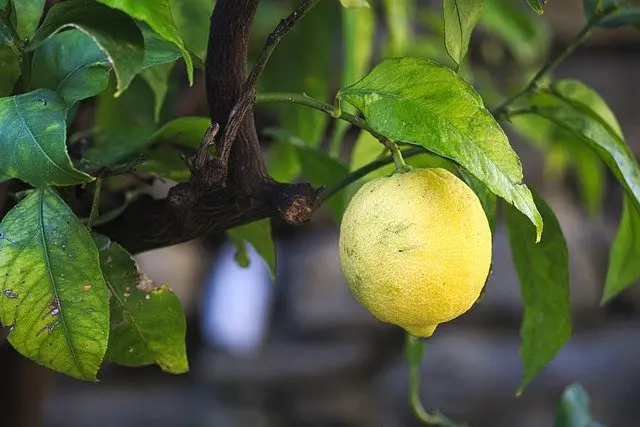Lemon fruits are the whole purpose of growing a lemon tree. But, when there are none, it is disappointing. If this happens to me, I would also wonder why my lemon tree doesn’t produce fruit.
Finding the problem and correcting it can restore lemons to your tree. Factors that can cause lemon trees not to produce fruit are:
- Nutrients
- Watering
- Maturity/Age
- Season
- Pollination
- Sunlight
Read on as we discuss how to get lemons on your tree.
How to Help Lemon Trees Produce Fruit?
There could be many reasons why your lemon tree is not being very successful in fruit production. It could be something in its immediate environment or it could be something simply out of your hands!
Here are all the factors that influence lemon production.
#1- Provide Nutrients Generously
Lemon trees grown in poor soil won’t grow much. To make matters worse your lemon trees won’t flower and this leads to no fruits as well. Fertile soil rife with essential nutrients is important for lemon trees to produce fruit.
Lemon trees are evergreen. This means these trees stay green and full of foliage throughout the year.
Unfortunately, this appealing characteristic of lemon trees comes at a high cost. Keeping all that greenery on display will require massive amounts of Nitrogen.
Lemon trees require double the amount of Nitrogen than Phosphorus and Potassium – two other essential nutrients. Hence a fertilizer is necessary and it must be in a ratio like this 2-1-1 (examples are 8-4-4 or 6-3-3).
Although Nitrogen, Phosphorus, and Potassium are required in high doses there are other nutrients whose presence in trace amounts is mandatory! Store-bought fertilizers usually have everything a lemon tree needs.
However, you may find your lemon tree is still lacking some nutrients in the right amounts.
If your lemon tree’s leaves turn brown it could be a sign of nutrient deficiencies of the following:
- Iron
- Magnesium
- Nitrogen
- Zinc
Luckily there is a solution. In addition to using ready-made fertilizers, you can also choose to make homemade lemon tree fertilizer. This will help you get in those rarer nutrients without paying an insane amount for them.
You would be surprised that the most fertile homemade fertilizer is actually a compilation of your garden and kitchen scraps and waste. But, doing this could prove to increase lemon tree fruit production.
#2- Be Consistent in Watering
Without water, no plant will grow. It is very important that you provide enough water to your lemon trees. Or else there will be repercussions, no fruit being one of them!
Are Your Lemons Drying Out Before Ripening?
Is your lemon tree developing fruits but they dry up and fall off before maturation? Perhaps they do develop but appear dry and juice-less inside. Well, there is only one likely cause for both of these conditions.
Lack of water is the most common cause of fruit dropping or desiccating. Insufficient water can also impact the appearance and texture of lemon fruits.
Seasons during which your lemon tree is producing lemons call for more than generous watering effort.
If you keep an eye on your fruit, you’ll know when they are drying up slightly. To fully form and take up that juicy texture, lemons need to carry out photosynthesis.
For successful photosynthesis your lemon tree will need three things:
- Nutrients
- Sunlight
- Water
While the first two are easier to manage, water is a bit trickier to provide in correct amounts. Excessive watering or insufficient amounts of water will easily affect flowering, fruiting, and the taste of the lemons.
Instead of watering small amounts daily, or testing the soil every 3 to 5 days, you can use the deep watering approach.
What is Deep Watering?
Deep watering is the activity of watering lemon trees generously for a long time. But, time intervals between waterings are also longer.
Why is deep watering better than regular watering efforts?
Well, deep watering stimulates the growth of deeper lemon tree roots. This makes the tree capable of stretching down to the water tables and finding its own water. Thus, it becomes less reliant on watering especially during drought.
Normal watering will induce the growth of shallow roots. Because the roots are getting what they want from you, they don’t need to grow deeper. This sounds fine but becomes a problem if you miss a few watering sessions.
In turn, this would damage the tree’s ability to produce completely normal lemons.
So, regardless of which watering approach you are applying you need to know when exactly to water your lemon trees.
As a rule of thumb, place your finger into the first 2 to 4 inches of soil. Only if the first 2-4 inches of soil are reasonably dry should you water the trees.
Also read: How to get your Meyer lemon tree to bloom.
#3- Patiently Wait For Maturity!
Sometimes the answers to the most complex problem are simple. Especially so If you are wondering why your lemon tree doesn’t produce fruit. Have you considered the age of your lemon tree?
All lemon trees take anywhere between 2 to 10 years to mature and be of age to produce fruit.
A few lemon trees may take longer than others to mature. Also, where you are growing your lemon tree from counts. Lemon trees grown from seeds will obviously take a long time to mature and produce fruit.
But, grafted lemon trees will mature faster and fruit faster because the lemon trees are grafted onto a mature rootstock. The younger plant is placed onto the established rootstock system.
This facilitates faster growth. Hence, the rate of flowering and fruiting is also faster.
#4- Is it the Right Season?
If there are no signs of your lemon tree producing fruit or even flowers chances are it isn’t the season yet!
Lemon trees are evergreen and some produce lemons all year round. But, others choose to fruit in the Spring to Summer time slot. There is nothing much you can do to change this except accept it!
To not be caught off-guard, we suggest checking the fruiting season of your lemon tree before you buy it and plant it. Doing this also helps to make your lemon tree more comfortable by knowing the right time to do it.
So, do your research!
#5- Help With Pollination
Yes, lemon trees like most citrus trees are self-pollinating. However, improving the chances of pollination can help in increasing the fruiting and taste of lemons.
But, most people don’t exactly know how to go about this operation. Lemon tree pollination can be improved by the following actions:
- Plant more citrus trees in close vicinity to each other.
- Plant flowers to attract pollinating insects and birds.
- Hand pollinate your lemon trees.
Note that lemon trees don’t need to be cross-pollinated; however, it can help to improve the appearance and taste of lemons.
If you are wondering what plants can help to invite pollinators, here’s a list of the best companion plants for lemon trees.
#6- Is My Lemon Tree Getting Enough Sunlight?
Sunlight is a crucial component of photosynthesis. Without enough sunlight, your lemon tree won’t be carrying out much photosynthesis. This is bad because a lack of this leads to less energy and less energy equates to less growth!
If your lemon tree is not getting enough sunlight this could be the reason why your lemon tree doesn’t produce fruit. Sunlight is one of the most essential elements lemon trees need for not only fruiting but growth and flowering as well.
Give your lemon tree a minimum of 6 hours of sunlight a day. More might be necessary if the sun is weak.
Check out more here – https://growveggy.com/b/do-lemon-trees-need-sun/
Other Reasons Why Your Lemon Tree Doesn’t Produce Fruit
The above tips might not help improve lemon yield if they are not the problem. Here are other reasons why lemon trees aren’t producing fruit.
Pruning
Pruning is a very important activity for maintaining any plant! In the case of lemon trees, it helps to eradicate dead foliage and re-route the energy to areas where it is required.
This could be fruit formation. Also, pruning clears a path to allow sunlight to penetrate the thick canopy.
Temperature Control
Lemon trees are most successful in fruiting when given the right climatic conditions. These are usually warm and humid regions.
You can try to alter appropriate conditions by bringing your lemon tree indoors. However, this is best done with a dwarf lemon tree.
Here are the 5 Best Dwarf Lemon Trees.
Conclusion
Having a fruit-less lemon tree is frustrating and will prompt you to wonder why my lemon tree doesn’t produce fruit.
But there are solutions to this once you figure out the problem. Common reasons for fruitless lemon trees are:
- Lack of nutrients
- Inadequate watering
- Maturity
- Incorrect fruiting season
- Pollination
- Not enough sunlight
Other reasons for the lack of lemon fruits are incorrect temperatures and no pruning.
Sometimes altering two of the above aspects will lead to better lemon production on your lemon tree. So, don’t give up if one doesn’t work.
FAQs
No, most lemon trees have evolved to become self-pollinating. That means flowers on the same tree will fertilize each other to produce fruit. But, cross-pollination can help improve lemons.
Start by choosing a sunny spot, providing fertile soil, and enough waiting. Later on, you can apply fertilizer, prune the tree, and maintain it. Apart from this, the tree should be mature enough and it should be the right season.


